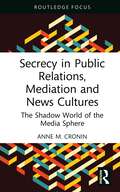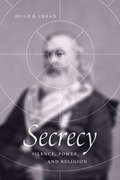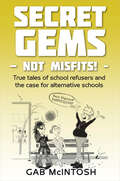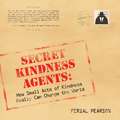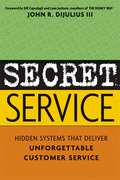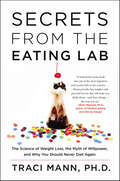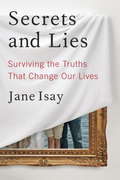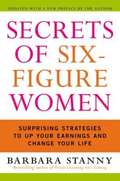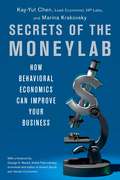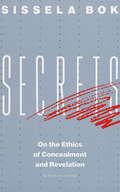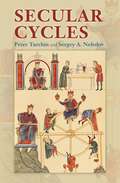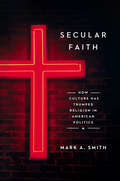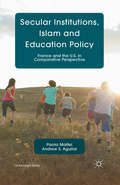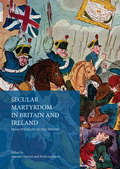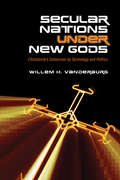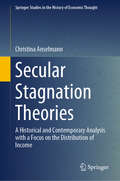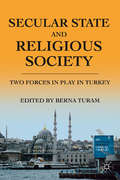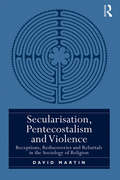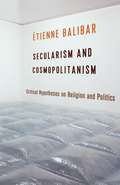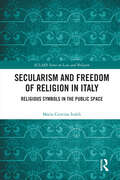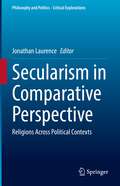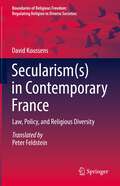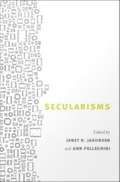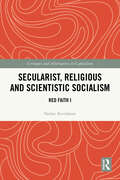- Table View
- List View
Secrecy in Public Relations, Mediation and News Cultures: The Shadow World of the Media Sphere (Routledge Focus on Media and Cultural Studies)
by Anne M. CroninThis book investigates the relationship of secrecy as a social practice to contemporary media, news cultures and public relations. Drawing on Georg Simmel’s theorisation of how secrecy produces a ‘second world’ alongside the ‘obvious world’ and creates and reshapes social relations, Anne Cronin argues for close analysis of the PR industry as a powerful vector of secrecy and an examination of its relationship to news cultures. Using case studies and in-depth interviews, as well as recent research in media and cultural studies, sociology, journalism studies and communication studies, the book analyses how PR practices generate a second, shadow world of the media sphere which has a profound impact on the ‘obvious world’. It interrogates both the PR industry’s and news culture’s role in shaping social relations for a digital media landscape, and those initiatives promoting transparency of data and decision-making processes. An insightful, interdisciplinary approach to debates on media and power, this book will appeal to students of public relations, sociology, media studies, cultural studies and communication studies. It will also be of interest to scholars and practitioners working at the intersections of media, social relations and public trust.
Secrecy: Silence, Power, and Religion (Routledge Handbooks In Religion Ser.)
by Hugh B. UrbanThe powers of political secrecy and social spectacle have been taken to surreal extremes recently. Witness the twin terrors of a president who refuses to disclose dealings with foreign powers while the private data of ordinary citizens is stolen and marketed in order to manipulate consumer preferences and voting outcomes. We have become accustomed to thinking about secrecy in political terms and personal privacy terms. In this bracing, new work, Hugh Urban wants us to focus these same powers of observation on the role of secrecy in religion. With Secrecy, Urban investigates several revealing instances of the power of secrecy in religion, including nineteenth-century Scottish Rite Freemasonry, the sexual magic of a Russian-born Parisian mystic; the white supremacist BrüderSchweigen or “Silent Brotherhood” movement of the 1980s, the Five Percenters, and the Church of Scientology. An electrifying read, Secrecy is the culmination of decades of Urban’s reflections on a vexed, ever-present subject.
Secret Gems - not Misfits!: True tales of school refusers and the case for alternative schools
by Gab McIntoshQuirky learning and unexpected happiness for school refusers at alternative schools - really? Who would have thought that school refusers turn out to be secret gems rather than sad misfits? The reader learns how the principal began her alternative schools with no money, no teaching resources, no premises, and few guidelines. One trained teacher; she was it. The only truly dependable resource was unhappy school kids, more than anyone expected. The results are both surprising and delightful. “Secret Gems - not Misfits! True tales of school refusers and the case for alternative schools” puts forwards the case for alternative schools and why they are so desperately needed all over the country. In an age where teachers are leaving their profession in droves, where kids academic results seem to stagnate, or plummet, alternative schools provide a refreshing insight into how we can do schooling differently and make education enjoyable again for teachers, parents and all kids, but particularly those kids called to the beat of a drum.
Secret Kindness Agents: How Small Acts of Kindness Really Can Change the World
by Ferial PearsonMoved by the Sandy Hook Elementary School tragedy, Ferial Pearson wondered if a simple act of kindness could change a life. She thought of the school where she taught and the students she guided every day and wondered, what would happen if we started secretly carrying out small acts of kindness in school? Could a modest act of compassion really change the course of a life? She posed the question to her students. They didn't have the answers but they were willing to find out. And so they became the Secret Kindness Agents. They not only changed the lives of those they met, they changed their own. Their hope, their hearts, and their hunger for happiness will inspire you to change your small corner of the world, in your own way, for the better. Let them show you how they did it, and how you can do the same.
Secret Service: Hidden Systems That Deliver Unforgettable Customer Service
by John DiJuliusAll businesses have customers, but how many of them deliver unforgettably good customer service?Customer experience expert and author John R. DiJulius reveals the hidden systems of the few exceptional companies that do: what actions they take behind the scenes to consistently surpass customer expectations. These organizations reap the benefits of greater customer loyalty, exponentially expanded referral networks, lower employee turnover, and stronger bottom-line results.Packed with examples applicable to a wide range of industries, Secret Service provides practical, realistic ways to:Turn customer complaints into positive experiences,Use marketing to go deeper with existing customers,Increase customer and employee retention,and turn bland customer service into truly memorable customer experiences.By quantifying and examining each phase of the "Customer Experience Cycle," Secret Service reveals clever, practical ideas that can be transformed into repeatable best practices in any organization and at every level.
Secrets From the Eating Lab: The Science of Weight Loss, the Myth of Willpower, and Why You Should Never Diet Again
by Traci MannA provocative expose of the dieting industry from one of the nation’s leading researchers in self-control and the psychology of weight loss that offers proven strategies for sustainable weight loss.From her office in the University of Minnesota’s Health and Eating Lab, professor Traci Mann researches self-control and dieting. And what she has discovered is groundbreaking. Not only do diets not work; they often result in weight gain. Americans are losing the battle of the bulge because our bodies and brains are not hardwired to resist food—the very idea of it works against our biological imperative to survive.In Secrets From the Eating Lab, Mann challenges assumptions—including those that make up the very foundation of the weight loss industry—about how diets work and why they fail. The result of more than two decades of research, it offers cutting-edge science and exciting new insights into the American obesity epidemic and our relationship with eating and food.Secrets From the Eating Lab also gives readers the practical tools they need to actually lose weight and get healthy. Mann argues that the idea of willpower is a myth—we shouldn’t waste time and money trying to combat our natural tendencies. Instead, she offers 12 simple, effective strategies that take advantage of human nature instead of fighting it—from changing the size of your plates to socializing with people with healthy habits, removing “healthy” labels that send negative messages to redefining comfort food.
Secrets and Lies
by Jane IsayBy the author of Walking on Eggshells, a compellingly readable journey into the realm of family secrets, offering lessons and insights for those who are hiding the truth and those who discover what has long been hidden. Secrets, large and small, are a fact of human life. This book explores the impact of keeping secrets and the power of truth. Secrets can damage our sense of self and our relationships. Even so, Jane Isay has found, people survive learning the most disturbing facts that have been hidden from them. And secret keepers are relieved when they finally reveal themselves--even the things they are ashamed of--to the people they care about. Much depends, Isay writes, on the way of telling and the way of hearing. Jane Isay was both a secret finder and a secret keeper. After fifteen years of marriage her husband admitted he was gay, but together they decided to keep it a secret for the sake of their two sons. Building on her personal experience, sixty intimate interviews, and extensive research into the psychology of secrets, Isay shows how the pain of secrets can be lightened by full disclosure, genuine apology, and time. Sometimes the truth sunders relationships, but often it saves them. Powered by detailed stories and Isay's compassionate analysis, Secrets and Lies reveals how universal secrets are in families. The big ones--affairs, homosexuality, parentage, suicide, abuse, hidden siblings--can be ruinous at first, but the effects need not last forever, and Isay shows us what makes the difference. With specific guidelines for those who keep secrets and those who find them out, Isay's book reveals the art of surviving a secret.
Secrets of Six-Figure Women: Surprising Strategies to Up Your Earnings and Change Your Life
by Barbara Stanny<p>According to the Department of Labor, the average woman in 1998 was bringing home less than $25,000 a year. For every dollar that a man makes, a woman makes between 50 and 75 cents, and that is hardly news. <p>But what you may not know is that, quietly and steadily, the number of women making six figures or more is rapidly increasing. Currently, over fifteen million women make $100,000 or more, and the number continues to rise at a rate faster then for men. And these women come from every industry - psychologists, dot com founders, consultants, freelance writers, and even part-timers. <p>What makes these particular women able to do so well in the workplace? Fueled by curiosity, Barbara Stanny, author of <i>Price Charming Isn't Coming: How Women Get Smart About Money</i>, set out to research this phenomenon. What she discovered was that, though the high-earning women she interviewed came from different backgrounds and had had greatly different work experiences, they all had certain characteristics in common. <p><i>Secrets of Six Figure Woman: Surprising Strategies of the Successful High Earners</i> will be a ground breaking book for high earners who want to ensure their wealth, enhance their success, and learn from others who are in the same boat. It will also offer inspiration, guidance, and motivation to those who aspire to make more.</p>
Secrets of the Moneylab
by Kay-Yut Chen Marina KrakovskyTaking the findings of behavioral economics from the cocktail party to the boardroom. Experimental economist Kay-Yut Chen leads an economics lab at Hewlett- Packard-the first of its kind at any company. His groundbreaking research into human behavior has turned into tangible results for HP. He has saved the company millions of dollars, simply by explaining why people really do the things they do. MoneyLab offers practical lessons being put to use right now at HP and other leading companies. It explains, for instance, how to: ? Use incentives to influence employees, suppliers, and buyers ? Determine whom to trust, and how much ? Reduce the negative effects of irrational behavior by noticing patterns that don't seem logical ? Take advantage of the human tendency to game the system In the spirit of Predictably Irrational, but with a more practical approach, Chen shows how to translate the findings of behavioral economics into concrete actions to achieve new levels of success.
Secrets: On the Ethics of Concealment and Revelation
by Sissela BokThe author of Lying shows how the ethical issues raised by secrets and secrecy in our careers or private lives take us to the heart of the critical questions of private and public morality.
Secular Cycles
by Peter Turchin Sergey A. NefedovMany historical processes exhibit recurrent patterns of change. Century-long periods of population expansion come before long periods of stagnation and decline; the dynamics of prices mirror population oscillations; and states go through strong expansionist phases followed by periods of state failure, endemic sociopolitical instability, and territorial loss. Peter Turchin and Sergey Nefedov explore the dynamics and causal connections between such demographic, economic, and political variables in agrarian societies and offer detailed explanations for these long-term oscillations--what the authors call secular cycles. Secular Cycles elaborates and expands upon the demographic-structural theory first advanced by Jack Goldstone, which provides an explanation of long-term oscillations. This book tests that theory's specific and quantitative predictions by tracing the dynamics of population numbers, prices and real wages, elite numbers and incomes, state finances, and sociopolitical instability. Turchin and Nefedov study societies in England, France, and Russia during the medieval and early modern periods, and look back at the Roman Republic and Empire. Incorporating theoretical and quantitative history, the authors examine a specific model of historical change and, more generally, investigate the utility of the dynamical systems approach in historical applications. An indispensable and groundbreaking resource for a wide variety of social scientists, Secular Cycles will interest practitioners of economic history, historical sociology, complexity studies, and demography.
Secular Faith: How Culture Has Trumped Religion in American Politics
by Mark A. SmithWhen Pope Francis recently answered "Who am I to judge?" when asked about homosexuality, he ushered in a new era for the Catholic church. A decade ago, it would have been unthinkable for a pope to express tolerance for homosexuality. Yet shifts of this kind are actually common in the history of Christian groups. Within the United States, Christian leaders have regularly revised their teachings to match the beliefs and opinions gaining support among their members and larger society. Mark A. Smith provocatively argues that religion is not nearly the unchanging conservative influence in American politics that we have come to think it is. In fact, in the long run, religion is best understood as responding to changing political and cultural values rather than shaping them. Smith makes his case by charting five contentious issues in America's history: slavery, divorce, homosexuality, abortion, and women's rights. For each, he shows how the political views of even the most conservative Christians evolved in the same direction as the rest of society--perhaps not as swiftly, but always on the same arc. During periods of cultural transition, Christian leaders do resist prevailing values and behaviors, but those same leaders inevitably acquiesce--often by reinterpreting the Bible--if their positions become no longer tenable. Secular ideas and influences thereby shape the ways Christians read and interpret their scriptures. So powerful are the cultural and societal norms surrounding us that Christians in America today hold more in common morally and politically with their atheist neighbors than with the Christians of earlier centuries. In fact, the strongest predictors of people's moral beliefs are not their religious commitments or lack thereof but rather when and where they were born. A thoroughly researched and ultimately hopeful book on the prospects for political harmony, Secular Faith demonstrates how, over the long run, boundaries of secular and religious cultures converge.
Secular Institutions, Islam and Education Policy: France and the U.S. in Comparative Perspective (St Antony's Series)
by P. Mattei A. AguilarAmidst claims of threats to national identities in an era of increasing diversity, should we be worried about the upsurge in religious animosity in the United States, as well as Europe? This book explores how French society is divided along conflicts about religion, increasingly visible in public schools, and shows the effect that this has had.
Secular Martyrdom in Britain and Ireland
by Keith Laybourn Quentin OutramThis edited collection examines the concept and nature of the 'people's martyrology', raising issues of class, community, religion and authority. It examines modern martyrdom through studies of Peterloo; Tolpudd≤ Feathersto≠ Tonypandy; Emily Davison, fatally injured by the King's horse on Derby Day, 1913; the 1916 Easter Rising; Jarrow, 'the town that was murdered, and martyred in the 1930s'; David Oluwale, a Nigerian killed in Leeds in 1965; and Bobby Sands, the IRA hunger striker who died in 1981. It engages with the burgeoning historiography of memory to try to understand why some events, such as Peterloo, Tonypandy and the Easter Rising, have become household names whilst others, most notably Featherstone and Oluwale, are barely known. It will appeal to those interested in British and Irish labour history, as well as the study of memory and memorialization.
Secular Nations under New Gods: Christianity’s Subversion by Technology and Politics
by Willem H. VanderburgThe ongoing political muscle-flexing of diverse Christian communities in North America raises some deeply troubling questions regarding their roles among us. Earlier analyses including Herberg’s Protestant, Catholic, Jew showed that these three branches of the Judaeo-Christian tradition correspond to three forms of the American way of life; while Kruse’s One Nation Under God showed how Christian America was shaped by corporate America. Willem H. Vanderburg’s Secular Nations under New Gods proceeds based on a dialogue between Jacques Ellul’s interpretation of the task of Christians in the world and Ellul’s interpretation of the roles of technique and the nation-state in individual and collective human life. He then adds new insight into our being a symbolic species dealing with our finitude by living through the myths of our society and building new secular forms of moralities and religions. If everything is political and if everything is amenable to discipline-based scientific and technical approaches, we are perhaps treating these human creations the way earlier societies did their gods, as being omnipotent, without limits. Vanderburg argues that until organized Christianity becomes critically aware of sharing these commitments with their societies, it will remain entrapped in the service of false gods and thereby will continue to turn a message of freedom and love into one of morality and religion.
Secular Stagnation Theories: A Historical and Contemporary Analysis with a Focus on the Distribution of Income (Springer Studies in the History of Economic Thought)
by Christina AnselmannIn light of weak economic performances and rising income disparities across the developed world during the past decades, this book provides a comprehensive overview of secular stagnation theories in the history of economic thought and examines the role of income distribution in various stagnation hypotheses. By offering a historical perspective, from the classical economists to the most recent stagnation debate of the early twenty-first century, the author shows that most stagnation theories were developed in periods of high and/or rising income disparities. Eventually, it was Josef Steindl, one of the least recognized stagnationists in the history of economic thought, who put the distribution of income at the heart of his stagnation theory. While Josef Steindl focused on the nexus between the functional distribution of income and economic growth, this book includes the personal distribution of income in a Kaleckian-Steindlian model of economic growth and stagnation. In the model presented, the nexus between economic growth and the distribution of income is a priori uncertain, depending on the type of economic shock and the specific economic circumstances. The author also discusses various empirically oriented policy implications aimed at fostering both economic growth and a more equal distribution of income. This book appeals to scholars in economics and the history of economic thought interested in economic growth, secular stagnation, and income distribution.
Secular State and Religious Society: Two Forces in Play in Turkey
by Berna TuramOn the basis of original, empirically rich, and theoretically sound social research, the chapters in this volume reveal and analyze the complex relations between the secular government of Turkey and the religious persons and society within the Turkish state.
Secularisation, Pentecostalism and Violence: Receptions, Rediscoveries and Rebuttals in the Sociology of Religion
by David MartinIn this book David Martin brings together a coherent summary of his many years of ground-breaking academic work on the sociology of religion. Covering key and contentious areas from the last half-century such as secularisation, religion and violence, and the global rise of Pentecostalism, it presents a critical recuperation of these themes, some of them first initiated by the author, and a review of their reception history. It then reviews that reception history in a way that discusses not only the subjects themselves, but also the academic practices that have surrounded them. As such, this collection is vital reading for all academics with an interest in David Martin’s work, as well as those involved with the sociology of religion and the study of secularisation more generally.
Secularism and Cosmopolitanism: Critical Hypotheses on Religion and Politics (European Perspectives: A Series in Social Thought and Cultural Criticism)
by Étienne BalibarWhat is the relationship between cosmopolitanism and secularism—the worldwide and the worldly? While cosmopolitan politics may seem inherently secular, existing forms of secularism risk undermining the universality of cosmopolitanism because they privilege the European tradition over all others and transform particular historical norms into enunciations of truth, valid for all cultures and all epochs. In this book, the noted philosopher Étienne Balibar explores the tensions lurking at this troubled nexus in order to advance a truly democratic and emancipatory cosmopolitanism, which requires a secularization of secularism itself.Balibar argues for the idea of the universal against its particular dominant institutions. He questions the assumptions that underlie popular ideas of secularism and religion and outlines the importance of a new critique for the contemporary world. Balibar holds that conflicts between religious and secular discourses need to be reframed from a point of view that takes into account the cultural hybridization, migration and mobility, and transformation of borders that have reshaped the postcolonial age. Among the topics discussed are the uses and misuses of the category of religion and the religious, the paradoxical genealogy of monotheism, French laïcité’s identitarian turn, and the implications of the responses to the Charlie Hebdo attacks for an extended definition of free speech. Going beyond circumscribed notions of religion and the public sphere, Secularism and Cosmopolitanism is a profound rethinking of identity and difference that seeks to make room for a renewed political imagination.
Secularism and Freedom of Religion in Italy: Religious Symbols in the Public Space (ICLARS Series on Law and Religion)
by Maria Cristina IvaldiThe display of religious symbols in the public space has been the subject of much debate. This book provides an overview of the presence of religious symbols in Italian public institutions from a legal standpoint.The situation is analysed from the perspective of the principles of laicità/secularism, as defined by the Constitutional Court, and freedom of religion. It is argued that while the display of religious symbols in public institutions has been widely investigated doctrinally, the wearing of religious symbols in Italy has generally been neglected. Key cases are examined in light of national jurisprudence as well as intervention by the European Court of Human Rights and relevant judgments from foreign courts regarding this issue. Finally, the work considers the presence of religious symbols that transcend national borders, as in the case of arts, sport and advertising. A comparison is made with the French system which takes a very different approach. The book outlines possible ways forward in light of the growing interculturality of European societies.It will be a valuable resource for academics, researchers and policy-makers working in the areas of law and religion, and comparative law.
Secularism in Comparative Perspective: Religions Across Political Contexts (Philosophy and Politics - Critical Explorations #23)
by Jonathan LaurenceThis book confronts the key questions surrounding comparative secularism in historical perspective. The contributions critically consider the normative ideas and alternative political arrangements that govern religion’s relation to politics and to the public and private spheres. Containing contributions by world-renowned scholars such as Michael Walzer, Asma Afsaruddin and Sudipta Kaviraj, this book recounts the arguments, debates, and disputations regarding secular arguments for accommodating religion. It does so in both critical and appreciative ways and describes some of the outcomes in actually existing institutions, policies, and practical arrangements. With the addition of many non-Western experiences and viewpoints on how secularism is theorized and lived, politically and historically and from Europe and Asia to Africa and the Americas, this volume is of great value political philosophers across the globe.
Secularism, Islam and Modernity
by M T Ansari Syed Alam KhundmiriSyed Alam Khundmiri (1922-83) was an important intellectual figure of his times, a true humanist with rare philosophical insights ranging over a wide field. The volume brings together Khundmiri's seminal essays which set out his dominant concerns: Marxism, with its indifference to questions of minorities in nationalism; existentialism, which he saw as being closed off to the problems of community; and Islam, which he examined in relation to history and notions of time and change. Overall, this absorbing collection of essays encapsulates Khundmiri's dual project of situating Islam in the modern context and scrutinizing the modern in the light of Islam. Particularly relevant in the present context of the increasing sacralization of politics, it will be read with great interest by students and scholars of philosophy, history, sociology, Islamic studies, Marxism, comparative religion, cultural studies, and political and social theory, as well as by the aware and concerned lay reader.
Secularism: Law, Policy, and Religious Diversity (Boundaries of Religious Freedom: Regulating Religion in Diverse Societies)
by David KoussensThe increasing visibility of Islam in France and the vehemence of debates about it have often contributed to narrow public perceptions of secularism to a simplistic antireligious crusade, a misleading image disseminated by the media and politicians alike. Taking the opposite stand, this book embarks on a comprehensive effort to document the multiple areas in which French secularism plays out - in debates over “cults,” places of worship, chaplaincy services in public institutions, the recognition of associations of worship, and more -, outlining and analizing the legal paths favored by the state in the regulation of religious diversity. While Islam has undoubtedly contributed to the reshaping of French secularism in the last decades, the book moves beyond what has come to be known as the "Muslim Question" to look at the multiplicity of challenges contemporary religious beliefs, practices, and organizations now pose to the state. David Koussens examines the main political and legal configurations of French secularism over the last thirty years through a sociological and juridical lens, in order to better document its diversity. Such a portrait emphasizes that French secularism is not a univocal phenomenon but one that appears in many guises.
Secularisms
by Ann Pellegrini Janet R. JakobsenAt a time when secularism is put forward as the answer to religious fundamentalism and violence, Secularisms offers a powerful, multivoiced critique of the narrative equating secularism with modernity, reason, freedom, peace, and progress. Bringing together essays by scholars based in religious studies, gender and sexuality studies, history, science studies, anthropology, and political science, this volume challenges the binary conception of "conservative" religion versus "progressive" secularism. With essays addressing secularism in India, Iran, Turkey, Great Britain, China, and the United States, this collection crucially complicates the dominant narrative by showing that secularism is multifaceted. How secularism is lived and experienced varies with its national, regional, and religious context. The essays explore local secularisms in relation to religious traditions ranging from Islam to Judaism, Hinduism to Christianity. Several contributors explicitly take up the way feminism has been implicated in the dominant secularization story. Ultimately, by dislodging secularism's connection to the single (and singular) progress narrative, this volume seeks to open spaces for other possible narratives about both secularism and religion--as well as for other possible ways of inhabiting the contemporary world. Contributors: Robert J. Baird, Andrew Davison, Tracy Fessenden, Janet R. Jakobsen, Laura Levitt, Molly McGarry, Afsaneh Najmabadi, Taha Parla, Geeta Patel, Ann Pellegrini, Tyler Roberts, Ranu Samantrai, Banu Subramaniam, Rajeswari Sunder Rajan, Angela Zito
Secularist, Religious and Scientific Socialism: Red Faith I (Critiques and Alternatives to Capitalism)
by Stefan ArvidssonThis book explores the various ways in which socialists have understood the relationship between their political beliefs and different religious and philosophical traditions.Considering the rise of secularism and the view that politics and life stances are two very different spheres, it moves to examine the thought of those who believed that faith and politics are as separate as night and day, those who, on the contrary, believed that socialism rests firmly on a religious foundation, and those who have argued that socialism’s foundations are solidly scientific and therefore atheist. An examination of a range of perspectives on socialism as a political ideology, a deep conviction and even a form of faith, Secularist, Religious, and Scientific Socialism explores the aesthetic, ethical, and existential ideals that have ignited the hearts of socialists, describing in detail how these ideals have been expressed in political activism, cultural forms, and ways of living.It will therefore appeal to scholars of intellectual history, political theory, political philosophy, and cultural history with interests in socialism and religion.
